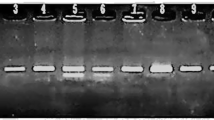Abstract
Purpose : To determine whether 5,10-methylenetetrahydrofolate reductase (MTHFR C677T and A1298C) genotype is associated with male infertility.
Methods : Analysis of cytogenetic, Y chromosomal microdeletion assay (Yq), and the C677T and A1298C polymorphisms of the MTHFR gene by pyrosequencing and PCR-Restriction Fragment Length Polymorphism (RFLP) method. SAS 8.1 assessed the statistical risk of MTHFR genotype.
Results : The homozygous (T/T) C677T polymorphism of the MTHFR gene was present at a statistically high significance in unexplained infertile men with normal karyotype, instead at no significance in explained infertile men with chromosomal abnormality or Y chromosome deletion. There was no statistically significance of A1298C variation in infertile males.
Conclusions : The MTHFR 677TT genotype may be a genetic risk factor for male infertility, especially with severe OAT and non-obstructive azoospermia in unexplained infertile males.
Similar content being viewed by others
References
Frosst P, Blom HJ, Milos R, Goyette P, Sheppard CA, Matthews RG, Boers GJ, den Heijer M, Kluijtmans LA, van den Heuvel LP, et al.: A candidate genetic risk factor for vascular disease: A common mutation in methylenetetrahydrofolate reductase. Nat Genet 1995;10:111–113
Van der Put NM, Gabreels F, Stevens EM, Smeitink JA, Trijbels FJ, Eskes TK, van den Heuvel LP, Blom HJ: A second common mutation in the methylenetetrahydrofolate reductase gene: An additional risk factor for neural-tube defects? Am J Hum Genet 1998;62:1044–1051.
Weisberg I, Tran P, Christensen B, Sibani S, Rozen R: A second genetic polymorphism in methylenetetrahydrofolate reductase (MTHFR) associated with decreased enzyme activity. Mol Genet Metab 1998;64:169–172.
Cattaneo M: Hyperhomocysteinemia, atherosclerosis and thrombosis. J Thromb Haemost 1999;81:165–176.
Wainfan E, Poirier LA: Methyl groups in carcinogenesis: Effects on DNA methylation and gene expression. Cancer Res 1992;52:2071s–2077s.
De Cabo SF, Hazen MJ, Molero ML, Fernandez-Piqueras J: S-adenosyl-l-homocysteine: A non-cytotoxic hypomethylating agent. Experientia 1994;50:658–659.
Balaghi M, Wagner C: DNA methylation in folate deficiency: Use of CpG methylase. Biochem Biophys Res Commun 1993;193:1184–1190.
James SJ, Pogribna M, Pogribny IP, Melnyk S, Hine RJ, Gibson JB, Yi P, Tafoya DL, Swenson DH, Wilson VL, Gaylor DW: Abnormal folate metabolism and mutation in the methylenetetrahydrofolate reductase gene may be maternal risk factors for Down syndrome. Am J Clin Nutr 1999;70:495–501.
Wong WY, Merkus HM, Thomas CM, Menkveld R, Zielhuis GA, Steegers-Theunissen RP: Effects of folic acid and zinc sulfate on male factor subfertility: A double-blind, randomized, placebo-controlled trial. Fertil Steril 2002;77:491–498.
Kruger TF, Menkveld R, Stander FS, Lombard CJ, Van der Merwe JP, van Zyl JA, Smith K: Sperm morphologic features as a prognostic factor in in vitro fertilization. Fertil Steril 1986;46:1118–1123.
Simoni M, Bakker E, Eurlings MC, Matthijs G, Moro E, Muller CR, Vogt PH: Laboratory guidelines for molecular diagnosis of Y-chromosomal microdeletions. Int J Androl 1999;22:292–299.
Simoni M: Molecular diagnosis of Y chromosome microdeletions in Europe: state-of-the-art and quality control. Hum Reprod 2001;16:402–409.
Ahmadian A, Gharizadeh B, Gustafsson AC, Sterky F, Nyren P, Uhlen M, Lundeberg J: Single-nucleotide polymorphism analysis by pyrosequencing. Anal Biochem 2000;280:103–110.
Friedman G, Goldschmidt N, Friedlander Y, Ben-Yehuda A, Selhub J, Babaey S, Mendel M, Kidron M, Bar-On H: A common mutation A1298C in human methylenetetrahydrofolate reductase gene: Association with plasma total homocysteine and folate concentrations. J Nutr 1999;129:1656–1661.
Yoo JH, Choi GD, Kang SS: Pathogenicity of thermolabile methylenetetrahydrofolate reductase for vascular dementia. Arterioscler Thromb Vasc Biol 2000;20:1921–1925.
Lengauer C, Kinzler KW, Vogelstein B: DNA methylation and genetic instability in colorectal cancer cells. Proc Natl Acad Sci USA 1997;94:2545–2550.
Kundu TK, Rao MR: CpG islands in chromatin organization and gene expression. J Biochem (Tokyo) 1999;125:217–222.
Bird AP: CpG-rich islands and the function of DNA methylation. Nature 1986;321:209–213.
Li E, Beard C, Jaenisch R: Role for DNA methylation in genomic imprinting. Nature 1993;366:362–365.
Stern LL, Mason JB, Selhub J, Choi SW: Genomic DNA hypomethylation, a characteristic of most cancers, is present in peripheral leukocytes of individuals who are homozygous for the C677T polymorphism in the methylenetetrahydrofolate reductase gene. Cancer Epidemiol Biomarkers Prev 2000;9:849–853.
Holliday R: The biological significance of meiosis. Symp Soc Exp Biol 1984;38:381–394.
Starkebaum G, Harlan JM: Endothelial cell injury due to copper-catalyzed hydrogen peroxide generation from homocysteine. J Clin Invest 1986;77:1370–1376.
Loscalzo J: The oxidant stress of hyperhomocyst(e)inemia. J Clin Invest 1996;98:5–7.
Huang RF, Huang SM, Lin BS, Wei JS, Liu TZ: Homocysteine thiolactone induces apoptotic DNA damage mediated by increased intracellular hydrogen peroxide and caspase 3 activation in HL-60 cells. Life Sci 2001;68:2799–2811.
Aitken RJ, Krausz C: Oxidative stress, DNA damage and the Y chromosome. Reproduction 2001;122:497–506.
Hughes CM, Lewis SE, McKelvey-Martin VJ, Thompson W: A comparison of baseline and induced DNA damage in human spermatozoa from fertile and infertile men, using a modified comet assay. Mol Hum Reprod 1996;2:613–619.
Ueland PM, Hustad S, Schneede J, Refsum H, Vollset SE: Biological and clinical implications of the MTHFR C677T polymorphism. Trends Pharmacol Sci 2001;22:195–201.
Skibola CF, Smith MT, Kane E, Roman E, Rollinson S, Cartwright RA, Morgan G: Polymorphisms in the methylenetetrahydrofolate reductase gene are associated with susceptibility to acute leukemia in adults. Proc Natl Acad Sci USA 1999;96:12810–12815.
Bezold G, Lange M, Peter RU: Homozygous methylenetetrahydrofolate reductase C677T mutation and male infertility. N Engl J Med 2001;344:1172–1173.
Franco RF, Araujo AG, Guerreiro JF, Elion J, Zago MA: Analysis of the 677 C→T mutation of the methylenetetrahydrofolate reductase gene in different ethnic groups. Thromb Haemost 1998;79:119–121.
Author information
Authors and Affiliations
Corresponding author
Rights and permissions
About this article
Cite this article
Park, J.H., Lee, H.C., Jeong, YM. et al. MTHFR C677T polymorphism associates with unexplained infertile male factors. J Assist Reprod Genet 22, 361–368 (2005). https://doi.org/10.1007/s10815-005-6795-0
Received:
Accepted:
Issue Date:
DOI: https://doi.org/10.1007/s10815-005-6795-0




